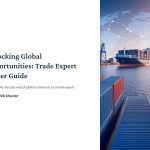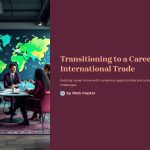 In today’s interconnected world, international trade stands as a cornerstone of economic growth and development. As nations and businesses strive to expand their reach across borders, the demand for skilled trade experts has surged. These professionals navigate the intricate web of global commerce, ensuring that goods, services, and capital flow seamlessly between countries. Embarking on a career as a trade expert offers not only the promise of professional growth but also the opportunity to play a pivotal role in shaping the global economy. This guide delves into the essential steps and considerations for building a successful career in international trade.
In today’s interconnected world, international trade stands as a cornerstone of economic growth and development. As nations and businesses strive to expand their reach across borders, the demand for skilled trade experts has surged. These professionals navigate the intricate web of global commerce, ensuring that goods, services, and capital flow seamlessly between countries. Embarking on a career as a trade expert offers not only the promise of professional growth but also the opportunity to play a pivotal role in shaping the global economy. This guide delves into the essential steps and considerations for building a successful career in international trade.

Understanding the Role of a Trade Expert
A trade expert serves as the linchpin in international commerce, adeptly managing and facilitating cross-border transactions. Their multifaceted role encompasses:
- Market Analysis: Scrutinizing global markets to identify emerging trends, potential opportunities, and areas of concern.
- Regulatory Compliance: Ensuring that all trade activities adhere to international laws, regulations, and standards, thereby mitigating legal risks.
- Negotiation: Crafting and finalizing agreements that are mutually beneficial, balancing the interests of all parties involved.
- Logistics Coordination: Overseeing the efficient movement of goods and services, optimizing supply chains to reduce costs and enhance delivery times.
- Risk Management: Identifying potential risks in international transactions and developing strategies to address them proactively.
By mastering these responsibilities, trade experts become invaluable assets to organizations aiming to thrive in the global marketplace.

Educational Pathways and Qualifications
Pursuing a career in international trade necessitates a solid educational foundation. Aspiring trade experts should consider:
- Undergraduate Studies: Degrees in fields such as International Business, Economics, or Supply Chain Management provide a comprehensive understanding of global commerce principles.
- Advanced Degrees: Pursuing a Master’s in Business Administration (MBA) with a focus on international trade or a Master’s in International Economics can offer deeper insights and specialized knowledge.
- Certifications: Obtaining professional certifications can significantly enhance credibility and expertise. Notable certifications include:
- Certified International Trade Professional (CITP): Recognizes proficiency in international trade practices.
- Certified Supply Chain Professional (CSCP): Focuses on supply chain management within a global context.
- Licensed Customs Broker: Authorizes individuals to assist businesses in meeting federal requirements for importing and exporting.
These educational pursuits equip individuals with the theoretical knowledge and practical skills essential for success in the field.

Gaining Practical Experience
While academic credentials lay the groundwork, practical experience is crucial for honing the skills of a trade expert:
- Internships: Engaging in internships with multinational corporations, trade organizations, or government agencies offers hands-on exposure to international trade operations.
- Entry-Level Positions: Roles such as trade analyst or logistics coordinator provide foundational experience and insights into the day-to-day functions of trade professionals.
- Mentorship: Building relationships with seasoned trade experts can offer guidance, industry insights, and valuable networking opportunities.
Accumulating diverse experiences enables aspiring trade experts to navigate the complexities of global commerce effectively.

Developing Essential Skills
Success in international trade hinges on a blend of technical and soft skills:
- Cultural Competency: Understanding and respecting cultural differences is vital when negotiating and conducting business across borders.
- Communication: Clear and persuasive communication facilitates effective negotiations and fosters strong international relationships.
- Analytical Thinking: The ability to assess market data, interpret trade regulations, and develop strategic plans is critical.
- Adaptability: The global trade landscape is ever-evolving; being flexible and responsive to changes ensures sustained relevance.
- Technological Proficiency: Familiarity with trade-related software and platforms enhances efficiency and accuracy in managing transactions.
Cultivating these skills positions trade experts to navigate the multifaceted challenges of international commerce adeptly.

Networking and Professional Development
Building a robust professional network and committing to ongoing development are integral to a thriving career in trade:
- Industry Associations: Joining organizations such as the International Chamber of Commerce (ICC) or local trade councils provides access to resources, events, and a community of professionals.
- Conferences and Seminars: Attending industry events keeps professionals abreast of the latest trends, policies, and technologies shaping global trade.
- Online Platforms: Engaging with professional networks on platforms like LinkedIn facilitates connections with peers, mentors, and potential employers worldwide.
Active participation in the professional community enhances visibility and opens doors to new opportunities.

Staying Informed and Adapting to Change
The international trade environment is dynamic, influenced by geopolitical shifts, economic policies, and technological advancements:
- Continuous Learning: Enrolling in courses, workshops, and webinars ensures that trade experts remain knowledgeable about current practices and emerging trends.
- Monitoring Global Developments: Keeping a pulse on international news and ectrade expert career developmentonomic indicators aids in anticipating market movements and adjusting strategies accordingly.
- Regulatory Updates: Regularly reviewing changes in trade laws and agreements prevents compliance issues and identifies new opportunities.
By remaining informed and adaptable, trade experts can proactively navigate the complexities of the global market.
*Capturing unauthorized images is prohibited*




